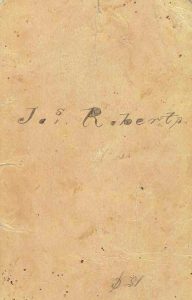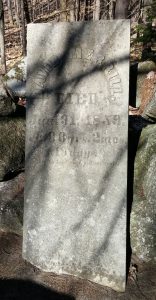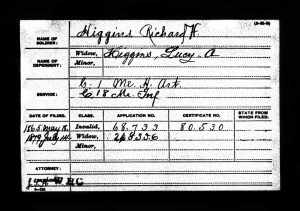 Grandma, Nana, Memaw, Nonna, Babushka: however they’re known, most cultures venerate grandmothers in some way, often through memories of food and its preparation. So it was that while working through a binder of cookie recipes for my annual Christmas Cookie-Baking Binge, I decided to find out what my grandmothers and great-grandmothers baked for Christmas goodies. After all, our ancestors connect to us with food. However, I come from a rather reticent family steeped more in routine than tradition, especially when it comes to holidays. I was starting from a point of nonspecific direction, a condition entirely too familiar. Continue reading Kerosene and other cookies
Grandma, Nana, Memaw, Nonna, Babushka: however they’re known, most cultures venerate grandmothers in some way, often through memories of food and its preparation. So it was that while working through a binder of cookie recipes for my annual Christmas Cookie-Baking Binge, I decided to find out what my grandmothers and great-grandmothers baked for Christmas goodies. After all, our ancestors connect to us with food. However, I come from a rather reticent family steeped more in routine than tradition, especially when it comes to holidays. I was starting from a point of nonspecific direction, a condition entirely too familiar. Continue reading Kerosene and other cookies
Tag Archives: Family papers
Compiling knowledge
 Applicants to the Society of the Descendants of the Colonial Clergy (SDCC) must have “a proven lineal lawful descent from a clergyman who was regularly ordained, installed, or settled over a Christian church within the limits of the thirteen colonies prior to 4 July 1776.” Although not a descendant of a colonial clergy ancestor, I was invited to attend the SDCC business meeting on Saturday, 4 November 2017, because I was a speaker during their annual meeting luncheon. Continue reading Compiling knowledge
Applicants to the Society of the Descendants of the Colonial Clergy (SDCC) must have “a proven lineal lawful descent from a clergyman who was regularly ordained, installed, or settled over a Christian church within the limits of the thirteen colonies prior to 4 July 1776.” Although not a descendant of a colonial clergy ancestor, I was invited to attend the SDCC business meeting on Saturday, 4 November 2017, because I was a speaker during their annual meeting luncheon. Continue reading Compiling knowledge
‘Crushed by our great loss’

61 Bowdoin Street, Boston, Monday, 17 April 1865: We have captured Mobile, with 3,000 prisoners & 300 cannon. We have long held its harbor & forts – now this, the last important Southern seaport, is in our hands. A few days ago how gladly we would have greeted this good news – now we are so crushed by our great loss, so stunned by the awful circumstances attending it, that we hardly give any heed to the new tale of success!
President Lincoln’s funeral takes place on Wednes’y April 19th! The anniversary of battle of Lexington – and of the firing on Mass. 6th in 1861, by the mob in Baltimore. Continue reading ‘Crushed by our great loss’
A missing Merrill

Alicia Crane Williams’s post earlier this week – about when an incorrect item was “published in a book” – is quite fresh in my mind as I contemplate a current genealogical problem. Last week I wrote about Gary Boyd Roberts’s research on a distant kinship between Meghan Markle and Prince Harry of Wales. There are several parts of Markle’s American ancestry that a group of us (including Gary and several genealogical colleagues) has been looking into, but the one that keeps coming up regards Meghan Markle’s great-great-great-great-grandfather David Merrill (1768–1859) of Holderness, New Hampshire.[1]
Numerous online trees claim that David Merrill was the son of Jacob Merrill and Elizabeth Wyatt, and this claim is even “published in a book”: The Makers of the Sacred Harp (Champaign, Ill., 2010): Continue reading A missing Merrill
Bunching pensions
 I wrote two years ago about the incredible value of Civil War pensions, but a recent example reminded me that occasionally just getting a valuable pension may be challenging as well. Whenever I realize a Civil War pension exists, whether for a book project or an article, I almost always request it, on the strong likelihood that it will provide further genealogical information, as well as substantial biographical data on the veteran’s life, his widow, and sometimes other family members. Continue reading Bunching pensions
I wrote two years ago about the incredible value of Civil War pensions, but a recent example reminded me that occasionally just getting a valuable pension may be challenging as well. Whenever I realize a Civil War pension exists, whether for a book project or an article, I almost always request it, on the strong likelihood that it will provide further genealogical information, as well as substantial biographical data on the veteran’s life, his widow, and sometimes other family members. Continue reading Bunching pensions
‘To have his family around him’

As a genealogist, I have so much to give thanks for. Soon after I started my genealogical quest, I discovered that the Nantucket Historical Association had correspondence from my great-great-great-grandfather[1] in their collections. Of course I was anxious to read it and asked for copies … not knowing that there were more than eighty letters, many of them comprising multiple pages!
It took a while to accustom myself to my ancestor’s writing, since he adopted a sort of modified scripto continua, with virtually no punctuation or capital letters at the start of sentences. Much of the correspondence was dry, relating to business transactions, but there were also many droll comments and insights into the character and activities of the extended family. Continue reading ‘To have his family around him’
Reverse dower
 From a modern perspective, we might think that women had no legal rights in the “old” days, but there actually were many ways in which women were legally protected. For example, husbands could not abandon wives and families (although one had to catch the husband to make him pay up). Another right that we regularly see is the right of dower given to the wife: she was entitled to inherit one third of her husband’s estate, no matter what he might have thought about it. This right is often expressed in land records when the husband sells land and the wife “releases” her dower rights to the property. Not all deeds include this release, but the right was there and the transaction could later be contested without it. Continue reading Reverse dower
From a modern perspective, we might think that women had no legal rights in the “old” days, but there actually were many ways in which women were legally protected. For example, husbands could not abandon wives and families (although one had to catch the husband to make him pay up). Another right that we regularly see is the right of dower given to the wife: she was entitled to inherit one third of her husband’s estate, no matter what he might have thought about it. This right is often expressed in land records when the husband sells land and the wife “releases” her dower rights to the property. Not all deeds include this release, but the right was there and the transaction could later be contested without it. Continue reading Reverse dower
‘These heart stirring times’

A day later, Richmond is relieved, and the Confederate army is on the run.
61 Bowdoin Street, Boston, Sunday, 2 April 1865: How insignificant amid all the tremendous interests of these heart stirring times seem all the small daily cares & petty duties that fill up a woman’s home life. Continue reading ‘These heart stirring times’
Family chronicles

Recently, Jennifer Jewett Dilley of Des Moines, Iowa, reached out to the Publications office at NEHGS to discuss permissions for a project. Jennifer explained that her father Gerald Anson Jewett Jr. is “92 years young,” and that they are writing a book that chronicles Gerald’s life and the times in which he lived. It currently stands at three hundred pages and is nearing completion. Jennifer mentioned that Gerald’s great-grandfather, George Anson Jewett, was a member of NEHGS many years ago. I wrote down his name and wondered if we’d be able to uncover anything of interest on George. Continue reading Family chronicles
‘Out of reach’

61 Bowdoin Street, Boston, Sunday, 19 February 1865: It is reported to-day that Sherman[2] has taken Columbia, S.C., and that the rebels are evacuating Charleston. It would really seem that the days of armed rebellion are nearly numbered – that this long war, big with fate as it is, to millions yet unborn of both races, white and black, must be at last drawing to a close. God grant it, in the fullness of His own time, which will not be till His work accomplished – till this great nation is redeemed from the sin and curse of slavery. Continue reading ‘Out of reach’